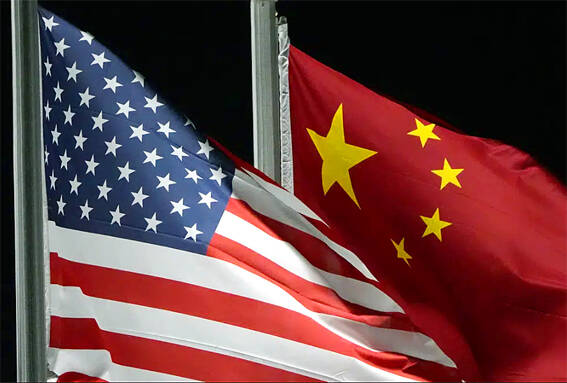The US Department of Commerce on Monday restricted exports to entities that it says recruited Western pilots to train Chinese military personnel, as well as some that helped develop hypersonic weapons.
They were among 43 groups added to the department’s so-called Entity List, which covers national-security threats.
“It is imperative that we prevent China from acquiring US technologies and know-how to enable their military modernization programs,” US Assistant Secretary of Commerce for Export Enforcement Matthew Axelrod said in a statement.

Photo: AP
Aviation Industry Corporation of China 612 Institute (中國航空工業集團612研究所) was among those added for seeking US items to help Beijing’s military modernization, with ties to activities including design and manufacturing of air-to-air missiles.
Shanghai Supercomputing Technology Co (上海超算科技) was added for supporting the operation of supercomputers in China, specifically by offering cloud-based supercomputing capabilities to support hypersonic research.
The US action over recruiting pilots follows reports last year, including in the Wall Street Journal in December, that China’s military had sought to enlist veteran Western pilots to improve its ability to fly planes from aircraft carriers, which could be useful in the event of a conflict with the US.
In addition to 31 Chinese entities, the department added five firms from the United Arab Emirates, four from Pakistan, three from South Africa, two from the UK, and one each from Kenya, Laos, Malaysia, Singapore and Thailand.
Entities were also added for contributing to Pakistan’s ballistic-missile program and other weapons.
The Entity List is a roster of people and organizations to which US companies cannot export technology without first securing a license, which requires a strong case for why an exception should be made.
The list has traditionally covered foreign scientists and shell companies, and it has been used to cut off sales to terrorist groups. In the past few years, the list has expanded to include more than 600 Chinese entities, including large companies such as computer server maker Inspur Group (浪潮集團) and chipmaker Semiconductor Manufacturing International Corp (中芯國際).

Zhang Yazhou was sitting in the passenger seat of her Tesla Model 3 when she said she heard her father’s panicked voice: The brakes do not work. Approaching a red light, her father swerved around two cars before plowing into a sport utility vehicle and a sedan, and crashing into a large concrete barrier. Stunned, Zhang gazed at the deflating airbag in front of her. She could never have imagined what was to come: Tesla Inc sued her for defamation for complaining publicly about the vehicles brakes — and won. A Chinese court ordered Zhang to pay more than US$23,000 in

Taiwan Semiconductor Manufacturing Co (TSMC, 台積電) yesterday said that its investment plan in Arizona is going according to schedule, following a local media report claiming that the company is planning to break ground on its third wafer fab in the US in June. In a statement, TSMC said it does not comment on market speculation, but that its investments in Arizona are proceeding well. TSMC is investing more than US$65 billion in Arizona to build three advanced wafer fabs. The first one has started production using the 4-nanometer (nm) process, while the second one would start mass production using the

A TAIWAN DEAL: TSMC is in early talks to fully operate Intel’s US semiconductor factories in a deal first raised by Trump officials, but Intel’s interest is uncertain Broadcom Inc has had informal talks with its advisers about making a bid for Intel Corp’s chip-design and marketing business, the Wall Street Journal reported, citing people familiar with the matter. Nothing has been submitted to Intel and Broadcom could decide not to pursue a deal, according to the Journal. Bloomberg News earlier reported that Taiwan Semiconductor Manufacturing Co (TSMC, 台積電) is in early talks for a controlling stake in Intel’s factories at the request of officials at US President Donald Trump’s administration, as the president looks to boost US manufacturing and maintain the country’s leadership in critical technologies. Trump officials raised the

From George Clooney to LeBron James, celebrities in the US have cashed in on tequila’s soaring popularity, but in Mexico, producers of the agave plant used to make the country’s most famous liquor are nursing a nasty hangover. Instead of bringing a long period of prosperity for farmers of the spiky succulent, the tequila boom has created a supply glut that sent agave prices slumping. Mexican tequila exports surged from 224 million liters in 2018 to a record 402 million last year, according to the Tequila Regulatory Council, which oversees qualification for the internationally recognized denomination of origin label. The US, Germany, Spain,